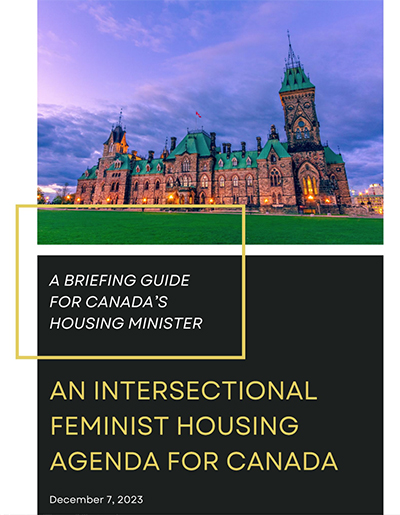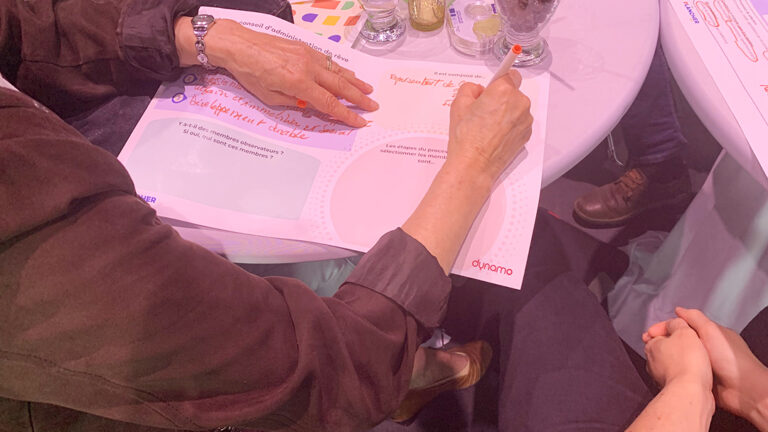Households headed by women and gender-diverse people face chronic housing problems. They’ve been caught in a persistent and vicious cycle for years, yet gender and intersectionality remain largely absent in the quest for solutions to the crisis. A diverse coalition has united to provoke and accelerate change by launching an information guide entitled “An Intersectional Feminist Housing Agenda for Canada.”
The needs are indeed urgent, and the households in question are disproportionately affected by the crisis. We recognize the different manifestations of inequality observed through our day-to-day activities in the community housing sector:
- Many women find themselves forced to make heart-breaking choices between adequate housing and basic necessities such as food.
- Women with particular identities, who are, and always have been, confronted with problems of discrimination and barriers to accessibility, now find themselves in a more difficult situation.
- Single-parent households navigating the rental market face great difficulties. With only one income, rent constantly on the rise, and not to mention wage disparities, their task is made more difficult.
- Women are often forced to resort to precarious survival strategies that perpetuate cycles of hidden homelessness, for fear of losing custody of their children or becoming victims of violence again.
- The vast majority of those who leave shelters are unable to find housing they can afford with the shortage of affordable housing across the country exacerbating the situation.
While there are many solutions, we still need a gender-focused approach, because this is a gendered crisis- and that is precisely what this recent appeal seeks to propel forward.
Inclusive and equitable housing to combat gender disparities
During the 16 days of activism against gender-based violence, the coalition is presenting 15 clearly identified calls to action. They include immediate actions, additions to initiatives already underway, and medium- and long-term actions.
“As a priority, the program recommends addressing the lack of appropriate housing and tackling discrimination issues. These problems contribute disproportionately to the violence and marginalization of women, particularly indigenous women, young girls and LGBTQ+ people,” confirms Stefania Seccia, Director of Advocacy and Communications for the Women’s National Housing & Homelessness Network.
The network, along with its Indigenous counterpart, the National Indigenous Women’s Housing Network, is guided by two steering committees of women and gender diversity representatives, including housing and homelessness stakeholders, service providers and researchers. In partnership with Pan-Canadian Voice for Women’s Housing and other players in the violence and housing sectors, these organizations have joined forces because it’s time for a united approach, to prevent “women in general, and people from diverse backgrounds … from falling through the cracks, and there are many reasons for that,” adds Seccia.
In other immediate actions, the program proposes to ensure gender equity in the funding of housing investments in the National Housing Strategy. The idea would be to prioritize investments that genuinely tackle the scale of poverty experienced by women and gender-diverse people.
More acute day-to-day difficulties in the Northwest Territories
The crisis is all the more acute in the Northwest Territories, where it has an immense impact on the safety of women and children. Invisibility remains a recurring theme in homelessness, especially among Indigenous women.
Lisa Thurber, founder and executive director of the Northwest Territories Tenants Association, says that tenants live in fear of eviction every day. The association she leads is a project the Centre has supported to effectively promote social inclusion, while trying to eliminate discrimination against women.
Thurber is a single parent herself and confirms that the housing situation in the Northwest Territories is so bad that, as a single parent, she cannot afford to rent. Any landlord will tell her that they need at least an income of $9,000 to $10,000 a month to rent to a woman. “The majority of women end up in public housing and they get stuck in that cycle and can’t get out.”
Thurber says housing in the North should be a priority, confirming that there is not enough housing and especially not enough affordable housing for women and children. According to her, “If enough money is allocated annually to provide housing for people, we can have housing here. It all comes down to the financialization of housing, and that’s what’s happening in the Northwest Territories: developers are making money on rents and taking away people’s livelihoods, all their wages, the food under their children’s mouths.”
The first call on the coalition’s agenda is to invest $4 billion in a housing strategy for urban, rural and northern indigenous populations, implemented by NICHI. Taking an intersectional approach, this proposal ensures that indigenous women and gender-diverse people benefit equitably from all funds.
For Seccia, “Writing this agenda is like writing a future for ourselves and the people we support.”
It is, in fact, about understanding the scope and depth of housing issues for women and gender-diverse people. Understanding is an important step in getting on track to solving these problems. It is a long road to realizing rights and ensuring a roof over every other person’s head, but acknowledging these issues is a step in the right direction.




